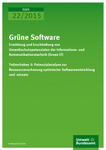Green Software. Identifying and tapping the environmental protection potential of information and communication technology (Green IT).
Abstract
Although software products are intangible goods, the use of software can trigger considerable material and energy flows. Software properties determine which hardware capacities are maintained and how much electrical energy is consumed in end devices, networks and data centres. The connection between software properties and the demand for natural resources triggered by the production and operation of ICT systems has so far been little studied scientifically. This study breaks new ground by exploratively investigating the influence of software on the indirect use of natural resources by hardware. The resource efficiency of software is thereby considered in the context of new forms of use such as mobile internet use and new software architecture patterns such as cloud computing. Against the background of the dynamics of the trends shown, the study identifies starting points in the software sector that can contribute to the conservation of natural resources or at least slow down further growth in their use by ICT systems. In particular, it addresses methodological problems that arise when assessing the resource use of software products. These problems include difficulties in defining functional units, measurement problems and allocation problems. Approaches such as the standardisation of usage patterns and benchmarks as well as the definition and implementation of sustainability requirements in the software development process are pointed out as possible solutions. Based on these considerations, the study formulates initial recommendations for action in the areas of research and standardisation, product labelling, configuration recommendations, best practice guides, and education and training in the area of resource-efficient software and its development.
Authors
Hilty, Lorenz M.; Behrendt, Siegfried; Evers-Wölk, Michaela; Fichter, Klaus; Hintemann, Ralph; Lohmann, WolfgangFields of research

Source information
Title
Green Software. Identifying and tapping the environmental protection potential of information and communication technology (Green IT).
TV 3: Potential analysis for resource conservation
Texts Volume 22/2015
Year of publication
2015
Publisher
Federal Environment Agency - Dessau
Document type
Book Monograph